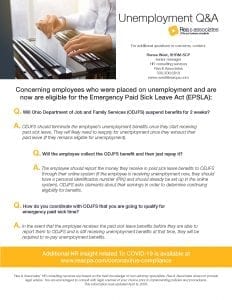Unemployment In Ohio Q&A
We know you have a lot of questions concerning employees who were placed on unemployment in Ohio and whether they are now eligible for the Emergency Paid Sick Leave Act (EPSLA) in the Buckeye state.
Over the last several weeks, we have seen the following questions arise repeatedly and wanted to share our insight with you. Of course, we know that the questions and answers provided here are only the very tip of the iceberg. You are more than welcome to send in your own specific questions using our Contact Us form and we will either add them to this page or connect you with our Human Resources Consulting Services team.
For your records, you may also download your own copy of this resource and refer to it in the future.
Q. Will the Ohio Department of Job and Family Services (ODJFS) suspend benefits for 2 weeks?
A. ODJFS should terminate the employee’s unemployment benefits once they start receiving paid sick leave. They will likely need to reapply for unemployment once they exhaust their paid leave (if they remain eligible for unemployment).
Q. Will the employee collect the ODJFS benefit and then just repay it?
A. The employee should report the money they receive in paid sick leave benefits to ODJFS through their online system (if the employee is receiving unemployment now, they should have a personal identification number (PIN) and should already be set up in the online system). ODJFS asks claimants about their earnings in order to determine continuing eligibility for benefits.
Q. How do you coordinate with ODJFS that you are going to qualify for emergency paid sick time?
A. In the event that the employee receives the paid sick leave benefits before they are able to report them to ODJFS and is still receiving unemployment benefits at that time, they will be required to re-pay unemployment benefits.
For additional information and guidance, please contact Renee West, SHRM-SCP, HR consulting services senior manager at renee.west@reacpa.com or 330.308.6818.
Rea & Associates’ HR consulting services are based on the best knowledge of non-attorney specialists. Rea & Associates does not provide legal advice. You are encouraged to consult with legal counsel of your choice prior to implementing policies and procedures. This information was last updated on April 6, 2020.

